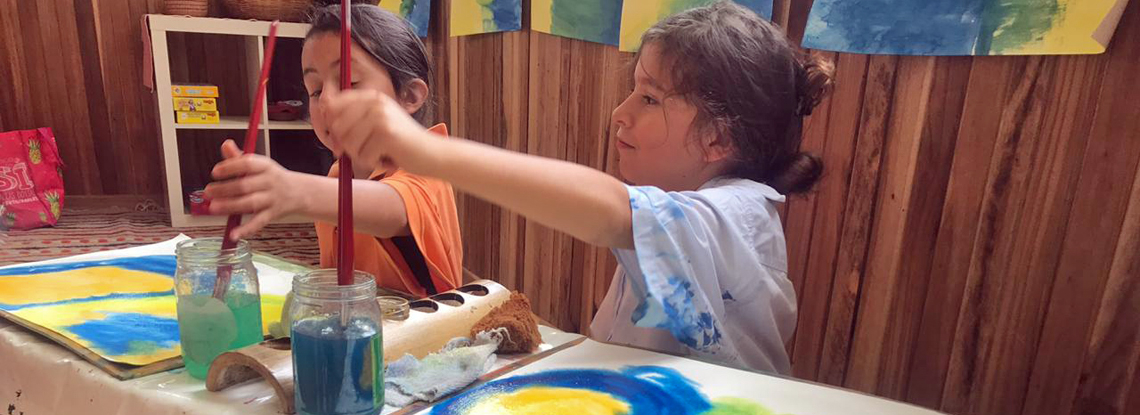"The creative part in us never sleeps"
KATÙ means "firefly" or "collection point" in the language of the Bribri, an indigenous people in Costa Rica. A fitting name for the Waldorf initiative, which became manifest in January 2018 with the founding of a kindergarten. The initiative in the capital San José rests on a firm foundation and developed step by step. It all began almost six years before the founding of KATÙ: A group of interested people asked the German Waldorf teacher Svenja Büntjen to introduce them to Waldorf education. At that time, Svenja Büntjen had moved to Costa Rica with her family due to her husband's job. The group of interested people changed again and again and grew at the same time. Finally the wish was expressed to set up a Waldorf training and the working group developed into a small Waldorf seminar. In an interview, Svenja Büntjen tells us how the small Waldorf School finally came into being.

When did the desire to start a school arise?
In San José we have the situation that the foundation of the kindergarten KATÙ is the result of a small local teacher training initiative. In its last year of training, this group used targeted public relations work to form a pool of people interested in Waldorf Education in Costa Rica, a pool from which the founding parents of the kindergarten and now also of the school emerged. The desire for a school has actually existed since the beginning of the teacher training in 2013, but the concrete preparations have only been in progress since 2017, due to the cooperation with the founding parents. The first class was opened on 1 February 2019.
Why is the establishment of a Waldorf School particularly important at this location?
In general, Waldorf is still very unknown in Latin America, especially in Central America. Many countries are in a difficult economic and political situation and are constantly experiencing riots, social conflicts and wars. These are not good conditions for the development of Waldorf education. In the last five years or so, however, there has been a growing demand for new educational ideas. People are looking for alternatives, not least because of the threatening climate change. Costa Rica, probably the leading country for environmental protection in Central America, paradoxically sticks to its traditional school system. Most children from public schools do not pass the entrance exams for the state universities, which are much cheaper than the private ones. The private schools, on the other hand, are primarily concerned with getting as much academic knowledge as possible into the heads of the children, at any price. I know of no other country where so many children need psychological help to get through school. Besides, most private schools are very expensive. There is a lack of alternative and meaningful school options.
What are the particular obstacles that had to be overcome to found the school?
Actually, the entire founding process is a veritable hurdle race; if we overcome one obstacle, the next one is already on the doorstep. From a European point of view, it is very difficult to imagine what it means to introduce a completely new form of education form to a country like Costa Rica. First, we must make people aware of the essence of Waldorf education, spark their interest and inspire them. Of course, this is particularly difficult if you don't have a showcase project. There is still no real Waldorf School in the country. So we have to be very creative and constantly think about new ways of proceeding strategically. Of course things are much better since the kindergarten was founded, because it speaks for itself.
Since we are still a very small community, the workload is very high. For financial reasons we have to do everything ourselves, that means we build all the furniture ourselves, make the toys, clean and cook, work on our huge garden, produce products for sale, do public relations almost every weekend, do press work, organize workshops, do handicraft groups for children, and now a mother and baby group. And of course all this has to be done at a high level, so that people feel attracted to our project.
The economic factor is still a very threatening concern for us as we still do not have enough children and many parents cannot pay the full school fees. However, the demand is already increasing considerably, and we have several requests per week. On the last Open Day we had, for the first time, more visitors who came because of a personal recommendation than visitors who followed an advertisement in the social media. That gives us hope, of course.
Which special moments, which joys do you encounter during your founding work?
One of the really great moments is the kind of encounters we have with each other. As a group, we have set ourselves the goal that social interaction must be the basis of our work. Especially in the Waldorf Schools, there are always great challenges when it comes to this topic. KATÙ is still in its infancy, and we still have the opportunity to develop a community that integrates the most diverse personalities. Of course there are conflicts, but we try to transform or accept them. It is a great gift to discover and accompany the development of our children together.
It's also fantastic to see what unusual ideas we've already come up with in our misery. The creative part in us never sleeps. Ever since I've been a part of KATÙ, I have a different view of the world; all of do, I think.
